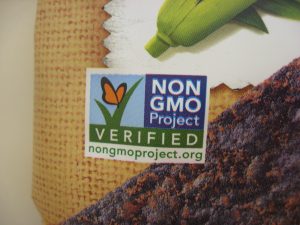Now GMO supporters want to deny consumers the right to know if their foods are non-GMO
By Ken Roseboro
Published: October 4, 2018
Category: The Organic & Non-GMO Report Newsletter, Non-GMO News
 Supporters of genetically engineered foods don’t like consumer transparency. They staunchly opposed efforts to label such foods in the U.S. for many years even though a majority of consumers support such labeling. Now, in another attack on consumer transparency, GMO proponents want to deny Americans the right to know if their foods are non-GMO. An obscure group that hypes itself as the “most authoritative science and technology think tank in the United States” has filed a petition with the U.S. Food and Drug Administration against the Non-GMO Project in the hopes of getting the Project’s ubiquitous butterfly label—as well as all non-GMO labels—banned from food packaging.
Supporters of genetically engineered foods don’t like consumer transparency. They staunchly opposed efforts to label such foods in the U.S. for many years even though a majority of consumers support such labeling. Now, in another attack on consumer transparency, GMO proponents want to deny Americans the right to know if their foods are non-GMO. An obscure group that hypes itself as the “most authoritative science and technology think tank in the United States” has filed a petition with the U.S. Food and Drug Administration against the Non-GMO Project in the hopes of getting the Project’s ubiquitous butterfly label—as well as all non-GMO labels—banned from food packaging.
GMO supporters such as the ITIF hate the success of the Non-GMO Project. The Project’s butterfly logo is now seen on some 50,000 food products and a recent survey by the Hartman Group found that 76 percent of Americans are familiar with the logo to varying degrees.
The Non-GMO Project’s success is due to the fact that more and more Americans don’t want to eat GMO foods. As a recent survey by Washington University in St. Louis found, many consumers are “grossed out” by GMO foods. The technology is seen as a risky, unnatural manipulation of foods. As a result, consumers are seeking out non-GMO foods, which has led to the Non-GMO Project’s success. Even major food manufacturers and brands such as Dannon, Gerber, Frito-Lay, Post, and Triscuits now offer Non-GMO Project Verified products. Others such as Hellmann’s, Breyer’s Ice Cream, Del Monte, Smucker’s and others promote the use of non-GMO ingredients on food labels.
ITIF’s petition claims the Non-GMO Project label is “widely despised in the agricultural sector.” Not by the world’s biggest grain processor, Cargill, which sells a range of ingredients that are non-GMO verified. The company’s CEO has said that if Americans want non-GMO foods then we should provide them. There are also many suppliers of non-GMO grains that are also verified.
The ITIF petition is spearheaded by Val Giddings, biotech industry lobbyist and former vice president of the Biotechnology Industry Association. Giddings has aggressively promoted GMO technology and staunchly opposed mandatory GMO labeling, having testified against such labeling at state legislatures when labeling bills have been introduced.
According to Giddings, the FDA needs to ban the use of non-GMO in order to “protect them against the confusion spread by these false claims.” Giddings’ arrogant position dismisses the concerns of 46 percent of shoppers who deliberately avoid GMOs when shopping and would block the choices of another 42 percent who want non-GMO food and seek out Non-GMO Project Verified products.
According to several food labeling experts, ITIF’s petition is not likely to gain much traction at the FDA. Ivan Wasserman, managing partner with the firm Amin Talati Upadhye, said that commercial speech with non-GMO claims is protected by the First Amendment and a prohibition on such claims would “likely be challenged on Constitutional grounds and would have to overcome substantial hurdles to survive.”
The National Law Review also said the petition is likely to fail: “It is unlikely the FDA will respond to ITIF’s citizen petition favorably, especially in light of the fact that many consumers are accustomed to seeing non-GMO claims on their food products.”
The Non-GMO Project issued a statement in response to the petition: “The petition to the F.D.A., filed by the Information Technology and Innovation Foundation, a biotech-backed think tank, is based on errors and misrepresentations. While it’s not surprising that this organization opposes the public’s right to know whether or not their food contains GMOs, the petition is factually inaccurate and fundamentally biased. We do not expect the petition to gain traction with the FDA.”
More and more consumers want more information about the foods they eat, including who grew it, where it comes from, and what ingredients are used. They also want “cleaner” foods with fewer, simpler ingredients. Non-GMO is part of that trend.
ITIF’s petition goes against the trends of consumer transparency and more natural foods and should be overwhelmingly rejected by the FDA.
Additional sources: FoodNavigator-USA.com, Food Business News, National Law Review
To view full articles, visit:
https://www.foodbusinessnews.net/articles/12567-petition-seeks-to-prohibit-non-gmo-claims-on-labels
https://www.natlawreview.com/article/itif-petitions-fda-to-prohibit-non-gmo-claims-food-labels








